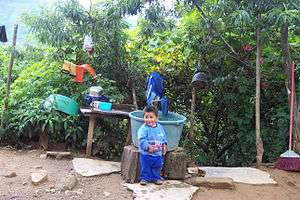Partners In Health
 | |
| Founded | 1987 |
|---|---|
| Founders | Paul Farmer; Jim Kim; Ophelia Dahl |
| Focus | Humanitarian |
| Location | |
Area served | Worldwide |
| Method | Aid |
Employees | 14,000 |
| Website | http://www.pih.org |

Partners In Health (PIH) is a Boston, Massachusetts-based non-profit health care organization founded in 1987 by Dr. Paul Farmer, Ophelia Dahl, Thomas J. White, Todd McCormack, and Dr. Jim Yong Kim.[1]
The goals of the organization are "to bring the benefits of modern medical science to those most in need of them and to serve as an antidote to despair." [2] PIH has innovated alternative methods to the conventional curative method of treatment for the sick and preventing diseases before they occur. This model believes that primary health care is essential because health is a right and therefore, it should be available to everyone.[3] PIH strives to bring good medical care to the poor by establishing long-term partnerships with local sister organizations.
History
The idea for Partners In Health first began when Paul Farmer and Ophelia Dahl helped set up a community-based health project in Cange, Haiti known as Zanmi Lasante ("Partners in Health").[4] For a number of years the organization focused its efforts almost exclusively on treating people with HIV/AIDS in rural Haiti. In the past decade, the organization's mission has expanded to include a more holistic approach to tackling disease and poverty. PIH devotes considerable resources to providing food, water, education and housing to sick patients. The organization also advocates for human rights both at the governmental and international NGO level.
In 1993, Dr. Farmer founded the Institute for Health and Social Justice (IHSJ), which is the research and advocacy arm of PIH. The IHSJ was founded using the proceeds of Dr. Farmer's John D. and Catherine T. MacArthur Award. The mission of the IHSJ is to analyze the impact of poverty and inequality on health, and to use these findings to educate and train students, academics, donors, policy makers, and lay people. As of 2006, the IHSJ is under the direction of Dr. Joia Mukherjee, PIH's Chief Medical Officer.[5]
The organization became a household name after author Tracy Kidder wrote The New York Times bestselling book Mountains Beyond Mountains: The Quest of Dr. Paul Farmer, a Man Who Would Cure the World. The book detailed Dr. Farmer's life and his work with PIH in Haiti and around the world. The title comes from a simplified translation of the Haitian phrase, deye mon, gen mon.
Current work
PIH is a Harvard-affiliated NGO. The organization works closely with Harvard Medical School and the Brigham and Women's Hospital.
The organization's model is described as being one in which: clinical and community barriers to care are removed as diagnosis and treatment are declared a public good and made available free of charge to patients living in poverty.[3] For people living in poverty stricken areas, the treatment of AIDS and multidrug-resistant tuberculosis (MDR-TB) has been made possible by this model of care.
One of the defining features that separates PIH from other NGOs is its commitment to hiring and training people who live in the communities where the organization works. Of the nearly 15,000 employees working for PIH, fewer than 150 are American.
PIH is an official supporting organization of Healthcare Information For All by 2015, a global initiative that aims to improve the availability and use of reliable healthcare information in low-income countries.
Haiti
Zanmi Lasante (“Partners In Health” in Haitian Creole) is PIH’s flagship project – the oldest, largest, most ambitious, and most replicated. The small community clinic that first started treating patients in the village of Cange in 1985, has grown into the Zanmi Lasante (ZL) Sociomedical Complex, featuring a 104-bed, full-service hospital with two operating rooms, adult and pediatric inpatient wards, an infectious disease center (the Thomas J. White Center), an outpatient clinic, a women’s health clinic (Proje Sante Fanm), ophthalmology and general medicine clinics, a laboratory, a pharmaceutical warehouse, a Red Cross blood bank, radiographic services, and a dozen schools.
The organization has also expanded its operations to 11 other sites across Haiti's Central Plateau and beyond. Today, ZL ranks as one of the largest nongovernmental health care providers in Haiti – serving a catchment area of 1.2 million across the Central Plateau and the Lower Artibonite. ZL employs over 4,000 people, almost all of them Haitians, including doctors, nurses and community health workers.
Community-based models
PIH's community-based model has proven successful in delivering effective care both for common conditions like diarrhea, pneumonia, and childbirth that often prove fatal for Haiti’s poor and malnourished, and for complex diseases like HIV and tuberculosis. A key to this success and to the PIH model of care pioneered in Haiti has been training and hiring thousands of accompagnateurs (community health workers) to prevent illness, monitor medical and socioeconomic needs, and deliver quality health care to people living with chronic diseases such as HIV and tuberculosis. The PIH model of accompagnateur care is outlined in the 5-SPICE framework, a scholarly article detailing the tenets of a successful community health worker program.[6]
The use of accompagnateurs is one of the most effective ways of removing structural barriers that prevent adequate treatment of HIV and other chronic diseases while increasing job growth in communities that desperately require employment to further benefit the social structure of the community. Focussing on minimizing the implications of structural violence is the key to the PIH model's success and to the improvement of treatment of chronic disease in rural Haiti.
Expansion in Haiti
As ZL has expanded, it has partnered with other nongovernmental organizations and the Haitian Ministry of Health to rebuild or refurbish existing clinics and hospitals, introduce essential drugs to the formulary, establish laboratories, train and pay community health workers, and complement Ministry of Health personnel with PIH-trained staff. Clinics that previously stood empty now register hundreds of patients each day across twelve sites—Cange, Boucan Carré, Hinche, Thomonde, Belladère, Lascahobas, Mirebalais, and Cerca La Source in the Central Plateau plus additions in the Artibonite region: Petite Rivière, Saint-Marc and Verrettes. In 2008, ZL recorded more than 2.6 million patient visits at clinical sites.
Response to the Haiti earthquake
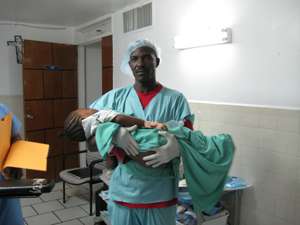
When the earthquake struck Haiti on January 12, 2010, PIH/ZL resources were in place to deliver aid. In addition to providing care to the hundreds of thousands who fled to Haiti’s Central Plateau and Artibonite regions, ZL established health outposts at four camps for internally displaced people in Port-au-Prince. ZL also supported the city’s General Hospital (HUEH) by facilitating the placement of volunteer surgeons, physicians and nurses, and by aiding the hospital’s Haitian leadership.
The earthquake left most of the health facilities in and around Port-au-Prince in ruins, including Haiti’s only public teaching hospital and nursing school, so in March 2010, PIH/ZL responded to an urgent appeal from the Haitian Ministry of Public Health and Population (MSPP) by announcing a 3-year, $125 million plan to help Haiti build back better called the Stand With Haiti campaign. Part of the plan included a scaled-up version of an already planned hospital, the Mirebalais Hospital.[7]
Hôpital Universitaire de Mirebalais

Before January 12, 2010, PIH had been planning to build a new community hospital in Mirebalais. After the earthquake, which left most of the health facilities in and around Port-au-Prince in ruins, including Haiti’s only public teaching hospital and nursing school, the organization quickly scaled up plans. Less than six months after the earthquake, the Haitian Ministry of Public Health and Population (MSPP) and PIH/ZL broke ground on the world-class national referral hospital and teaching center.
In October 2012, Partners in Health finished construction on the Hôpital Universitaire de Mirebalais. The hospital is intended to provide primary care services to about 185,000 people in Mirebalais and two nearby communities. It is also intended to serve most of the country for secondary and tertiary care. PIH expects to see 500 patients every day in its ambulatory clinics when the hospital is fully operational.
The hospital will also provide high-quality education for Haitian nurses, medical students, and resident physicians. It has telecommunication technologies installed in meeting and operating rooms than link US-based medical professionals to help educate and train students and residents working there.[8][9]
Other locations
Peru
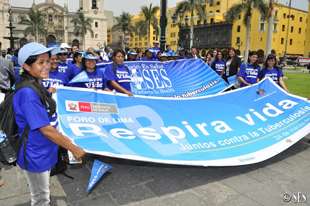
Since 1994, PIH’s sister organization in Peru, Socios En Salud (SES), has been treating disease and training community members to provide prevention and care for their neighbors in the shantytowns around Lima. Based in the northern Lima town of Carabayllo, SES is now Peru’s largest non-governmental health care organization, serving an estimated population of 700,000 inhabitants, many of whom have fled from poverty and political violence in Peru’s countryside. As a valued partner to Peru's Ministry of Health, SES has also had an impact on national policies for prevention and treatment of drug-resistant tuberculosis and HIV and provides important training and support to help implement those policies nationwide.
SES also provides food baskets, transportation, lodging and social support for impoverished patients whose needs have been confirmed by an extensive interview and evaluation. The project also provides opportunities for income generation projects, job skills training, and small loans to start businesses. One example is Mujeres Unidas ("Women United"), a cooperative workshop that participates in crafts fairs in Peru and has sold handicrafts as far away as the United States, Japan and Switzerland.
SES is currently in conducting the world's largest TB research study, called the EPI Project. Funded by a National Institutes of Health grant, the project seeks to understand how MDR-TB and XDR-TB spreads between people living in close quarters.
Chiapas, Mexico
The residents of the southern Mexican state of Chiapas, including millions of indigenous Maya, have long struggled with poverty, political violence, and dismal health conditions. Chiapas is burdened with extremely high rates of maternal mortality, infant mortality, and tuberculosis when compared to other states in Mexico. Work aims to provide a more reliable, community-based alternative by training and employing local community health promoters, called promotores.
El Equipo de Apoyo en Salud y Educación Comunitaria (EAPSEC, The Team for the Support of Community Health and Education) was established in 1985 by a small group of Mexican health promoters. They initially worked with Guatemalan refugee communities in the Chiapas border region, and later expanded their work to other marginalized people in Chiapas. EAPSEC believes that "a life of dignity" is a human right. This includes a strong public health system that responds to the most pressing health needs of the population, and access to high quality health care.
Since 1989, PIH has collaborated with EAPSEC to improve medical infrastructure in the region and to recruit and train hundreds of promotores. Over the past two decades, EAPSEC has partnered with dozens of indigenous and rural communities throughout Chiapas to develop local health capacity. Recent work has focused on a network of communities in the area of Huitiupan in the highlands and in the area of Amatan. EAPSEC is dedicated to helping communities build self-sufficiency and counts many successful community health groups throughout Chiapas among its "alumni.”
 PIH's project in Mexico gave illiterate women cameras, allowing them to document their lives. |
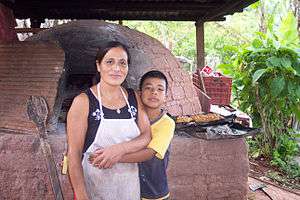 Many of the women took images of family members, but a surprising number were of stoves, kitchen shelves, and wells. |
Guatemala
Equipo Técnico de Educación en Salud Comunitaria (ETESC, Technical Team for Education in Community Health) was founded by refugees of the Guatemalan civil war who returned to help rebuild their country. Today it has evolved into a community nonprofit that seeks to revitalize and repair the social fabric in the rural communities of Huehuetenango, Guatemala, through holistic development.
The organization provides health care, legal accompaniment, and education to each of the communities with which it works.
Boston
The Prevention and Access to Care and Treatment (PACT) project serves the sickest and most marginalized HIV-positive and chronically ill patients living in the Greater Boston area. Adapting the accompagnateur model developed in Haiti, PIH’s only domestic health care program trains and employs community members as community health workers (CHW). These CHWs check in on some of the most marginalized and sick patients on a daily or weekly basis, making sure they attend medical appointments, take their medications, and have access to other essential needs and social services.
PACT’s health promotion and directly observed therapy programs target the hardest-to-reach patients: poor people of color living in inner-city Boston neighborhoods who have fallen through the cracks of other health care delivery systems. Often these people confront racial and language barriers, social isolation, mental illness, and drug or alcohol abuse. Some are homeless. Almost all live in poverty. These obstacles often mean that patients have difficulty taking all of their prescriptions on a regular basis.
In spite of these challenges, PACT’s community-based approach has proven to significantly improve the health of their clients, and has reduced costs to Massachusetts’s Medicaid system. For example, a recent study showed that HIV-positive patients enrolled in the program for 12 months experienced an average increase in CD4 count (a measurement of immune system strength) from a dangerously low 133 cells per microliter, to a much-improved level of 293. One Boston-area hospital reported that hospitalizations of AIDS patients enrolled in the PACT program decreased by 17 percent, and the costs for inpatient stays dropped by 37 percent.[10][11][12][13]
Russia
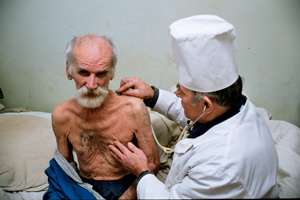
Partners In Health's work in Russia has a narrower medical focus over a vastly wider geographical area than any of its other projects. From a base in the region of Tomsk Oblast, Siberia, PIH has been working since 1998, in collaboration with the Russian Ministry of Health, to combat one of the world's worst epidemics of drug-resistant tuberculosis (MDR-TB). In partnership with the Division of Social Medicine and Health Inequalities (DSMHI) at the Brigham and Women’s Hospital, PIH has focused on improving clinical services for MDR-TB patients in Tomsk while undertaking training and research to catalyze change in treatment of MDR-TB across the entire Russian Federation.
Partners in Health began working with local clinicians to improve treatment of MDR-TB in Tomsk in 1998. Joint effort got a major boost in 2004, when assisted partners in Tomsk in securing a five-year $10.8 million grant from the Global Fund to Fight AIDS, Tuberculosis and Malaria for efforts to improve prevention, diagnosis and treatment of TB and MDR-TB. Key components of clinical effort include improving diagnostics in order to detect cases earlier, developing a comprehensive strategy to promote adherence among patients, improving infection control in hospitals and clinics and decreasing transmission of TB to HIV-positive patients. Work in Tomsk also encompasses health education for the public and clinical and program management training for medical personnel in Tomsk.[14][15]
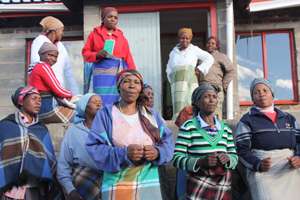
Burundi
In a country torn apart by civil war, extreme hunger and poverty, the village of Kigutu faced crippling disease, poor health, and misery in 2006. In an effort to respond to this crisis of care, Deogratias Niyizonkiza founded the nonprofit organization Village Health Works (VHW) to bring high-quality health care to this rural Burundi community, as well as to address the root of the village's poor health: poverty.
From its very beginning, VHW fostered close ties with PIH. VHW founder Deo met PIH founder Paul Farmer while studying at the Harvard School of Public Health, and he soon began working with PIH's partner organizations in Haiti and then in Rwanda (another country torn apart by genocide and civil war). Deo wanted to bring help to Burundi as well, and decided to create a health clinic in Kigutu, a village where his parents came to live when they returned to Burundi from refugee camps.
Lesotho
PIH's project in Lesotho was PIH's second project in Africa and the first in a country suffering from extremely high prevalence of HIV. Approximately one quarter of Lesotho's adult population is HIV-positive and life expectancy in the tiny mountain kingdom has plummeted to less than 40 years. In addition, the Basotho people are being ravaged by a second epidemic: tuberculosis. Lesotho's TB rate is among the highest in the world, and TB spreads rapidly and is particularly deadly where many people's immune systems are weakened by HIV. The PIH project in Lesotho was launched in 2006 following an invitation from the government of Lesotho and consultation with partners in Rwanda, the Clinton HIV/AIDS Initiative (CHAI, now known as the Clinton Health Access Initiative), about where to replicate that successful model elsewhere in Africa.[16]
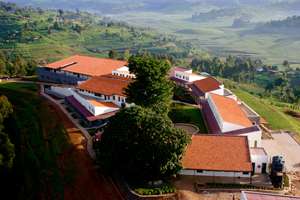
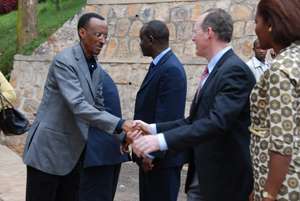
Rwanda
Partners In Health/Inshuti Mu Buzima (PIH/IMB) has been working in Rwanda since 2005. In partnership with the Government of Rwanda and the Clinton Health Access Initiative (CHAI), work supports the Ministry of Health to comprehensively strengthen the public health system in rural, underserved areas of the country. Initially, PIH and CHAI began by implementing a pilot project in two rural districts in Rwanda’s Eastern Province, Kayonza and Kirehe. Building off of PIH’s approach in Haiti, the project was designed as a comprehensive primary health care model within the public sector. The approach used HIV/AIDS prevention and care as the entry point to build capacity to address the major health problems faced by the local population. Haitian physicians, nurses, and managers traveled to Rwanda extensively in the early years of the program to provide training and program design assistance.
By the end of fiscal year 2011, PIH/IMB is on schedule to support 40 health facilities in three target districts, with over 1,280 clinical and support staff, and work with a network of 6,175 community health workers.
In January 2011, PIH supported the Ministry of Health of Rwanda in the opening of Butaro Hospital.[17][18][19]
Malawi
In early 2007, PIH and Abwenzi Pa Za Umoyo (APZU; Partners In Health in Chichewa), started treating patients and training community health workers in the southwestern corner of Malawi, one of the poorest and most densely populated countries in Africa.
The Clinton-Hunter Development Initiative (CHDI) targeted Malawi as a country desperately needing a rural health project to address the devastating HIV/AIDS epidemic in the region. About 14 percent of Malawi's adult population is infected with HIV and hundreds of thousands of children have been orphaned by the disease.
CHDI asked PIH to replicate the rural initiative programs that have proven so successful in delivering HIV treatment and comprehensive primary health care in Rwanda and Lesotho. The Malawi Ministry of Health directed PIH and CHDI to the impoverished rural area of Neno, and in early 2007, the partners began to implement an ambitious plan to combat the disease.
In 2010, APZU tested 17,606 patients for HIV. The organization clinics logged 332,619 patient visits. APZU supported 889 children, allowing them to attend school and receive food.[20]
Kazakhstan
In 2010, Partners In Health launched a new partnership to combat drug-resistant tuberculosis (MDR-TB) in Kazakhstan, a central Asian country that borders regions in Siberia where PIH-Russia has spearheaded a successful MDR-TB program since 1998. Because of PIH’s track record of curing and curbing the spread of drug-resistant tuberculosis in the Russian Federation, the Kazakhstan Ministry of Health invited PIH to help fight one of the highest rates of drug-resistant TB in the world.
Dominican Republic
The Partners In Health project in the Dominican Republic is a cross-border collaboration under the leadership of PIH's Haitian sister organization, Zanmi Lasante.
Consistent care is crucial to treating chronic diseases such as HIV and TB effectively. Because border populations are particularly vulnerable to lapses in care, making sure that everyone has access to care on both sides of the border is crucial for the long-term health of all those living in the border region, particularly people who are infected with HIV or TB. This project works to integrate past cross-border experiences between Haitian and Dominican Republic providers of care, many of whom have worked in the border region for a decade or longer. The Zanmi Lasante site of Belledare in Haiti and health care providers in the Dominican Republic program in Elias Pena are working together to make the goal of consistent care a reality.
 In Lesotho, PIH works with families affected by HIV, tuberculosis, and poverty. |
 PIH staff in Malawi celebrating after a training session. |
 In Rwanda, PIH treats thousands of people throughout the Butaro District every day. |
Partner Projects
PIH also supports partner projects in the following countries:
- Africa: Project Muso in Mali; Tiyatien Health in Liberia
- Asia: Nyaya Health in Nepal
See also
References
- ↑ Kidder, Tracy (2004). Mountains Beyond Mountains: The Quest of Dr. Paul Farmer, a Man Who Would Cure the World. Random House. p. 317. ISBN 978-0-8129-7301-3.
- ↑ http://www.pih.org/pages/our-mission
- 1 2 Farmer, Paul E., Bruce Nizeye, Sara Stulac, and Salmaan Keshavjee. 2006. "Structural Violence and Clinical Medicine". PLoS Medicine, 1686-1691.
- ↑ Kidder, Tracy (2004). Mountains Beyond Mountains: The Quest of Dr. Paul Farmer, A Man Who Would Cure the World. Random House. ISBN 978-0-8129-7301-3.
- ↑ "Advocacy & Policy". Partners In Health. Retrieved 6 May 2011.
- ↑ Palazuelos, D.; Ellis, K.; Daeun Im, D.; Peckarsky, M.; Schwarz, D.; Farmer, D. B.; Dhillon, R.; Johnson, A. et al. (2013). "5-SPICE: The application of an original framework for community health worker program design, quality improvement and research agenda setting". Global Health Action 6: 19658. doi:10.3402/gha.v6i0.19658. PMC 3617878. PMID 23561023
- ↑ "Hôpital Universitaire de Mirebalais". Partners In Health. Retrieved 28 August 2014.
- ↑ http://www.pih.org/pages/mirebalais
- ↑ Nicholas Clark Architects. "Mirebalais Hospital". Mirebalais Hospital. Retrieved 11 May 2011.
- ↑ Rosenberg, Tina (28 February 2011). "A Housecall to Help With Doctor’s Orders". A Housecall to Help With Doctor’s Orders (The New York Times). Retrieved 28 February 2011.
- ↑ Zimmerman, Rachel. "From Haiti To Harvard: Crucial Foot Soldiers Of Health Make Housecalls". WBUR - Boston's NPR affiliate. Retrieved 25 March 2011.
- ↑ Alpert, Jessica. "Home Healthworkers Make Getting Healthy Easier". Home Healthworkers Make Getting Healthy Easier. WBUR-Boston's NPR affiliate. Retrieved 9 May 2011.
- ↑ Brigham and Women's Hospital. "Boston (PACT)". Harvard Medical School. Retrieved 6 May 2011.
- ↑ Partners In Health. "Russia". PIH-Russia. Retrieved 11 May 2011.
- ↑ Splete, Heidi. "Partners In Health Treats TB in Russia". Partners In Health Treats TB in Russia. Hospital News Digital Network. Retrieved 11 May 2011.
- ↑ Partners In Health. "Lesotho". PIH. Retrieved 6 May 2011.
- ↑ Partners In Healh. "FROM NO DOCTORS TO THE "FINEST HOSPITAL IN CENTRAL AFRICA". PIH. Retrieved 6 May 2011.
- ↑ Philp, Rowan. "Rwanda's Medical Miracle". The Times (South Africa). Retrieved 6 May 2011.
- ↑ Kagire, Edmund. "Kagame opens new hospital in Butaro". New Times (Rwanda). Retrieved 6 May 2011.
- ↑ Partners In Health. "Annual Report 2010". Annual Report 2010: Malawi. Retrieved 9 May 2011.
External links
- Partners In Health
- A Conversation with Tracy Kidder about Mountains Beyond Mountains by Mark Klempner, 2008.
